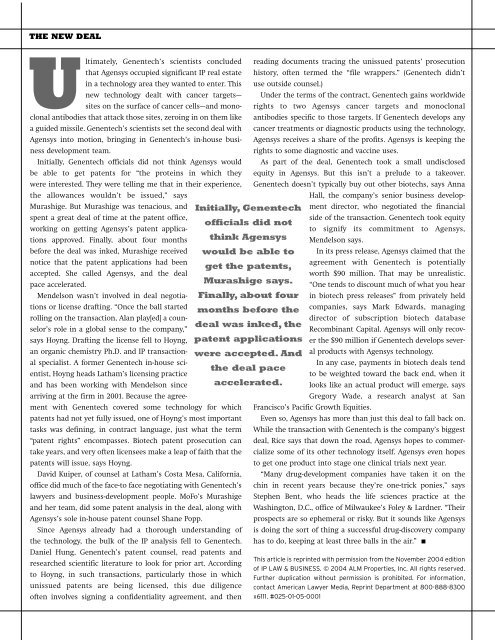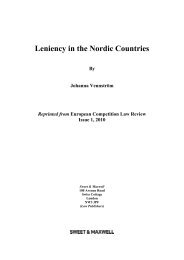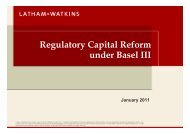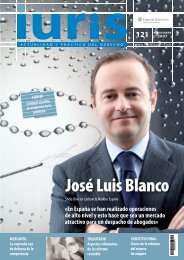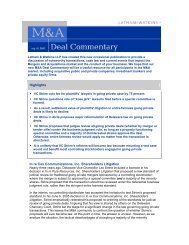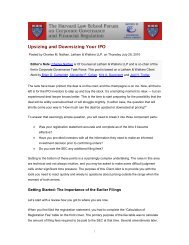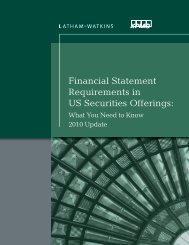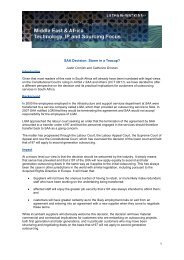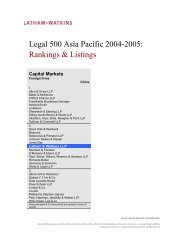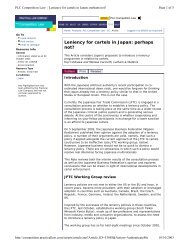IP Architects - Latham & Watkins
IP Architects - Latham & Watkins
IP Architects - Latham & Watkins
- No tags were found...
You also want an ePaper? Increase the reach of your titles
YUMPU automatically turns print PDFs into web optimized ePapers that Google loves.
THE NEW DEAL<br />
Ultimately, Genentech’s scientists concluded<br />
that Agensys occupied significant <strong>IP</strong> real estate<br />
in a technology area they wanted to enter. This<br />
new technology dealt with cancer targets—<br />
sites on the surface of cancer cells—and monoclonal<br />
antibodies that attack those sites, zeroing in on them like<br />
a guided missile. Genentech’s scientists set the second deal with<br />
Agensys into motion, bringing in Genentech’s in-house business<br />
development team.<br />
Initially, Genentech officials did not think Agensys would<br />
be able to get patents for “the proteins in which they<br />
were interested. They were telling me that in their experience,<br />
the allowances wouldn’t be issued,” says<br />
Murashige. But Murashige was tenacious, and<br />
spent a great deal of time at the patent office,<br />
working on getting Agensys’s patent applications<br />
approved. Finally, about four months<br />
before the deal was inked, Murashige received<br />
notice that the patent applications had been<br />
accepted. She called Agensys, and the deal<br />
pace accelerated.<br />
Mendelson wasn’t involved in deal negotiations<br />
or license drafting. “Once the ball started<br />
rolling on the transaction, Alan play[ed] a counselor’s<br />
role in a global sense to the company,”<br />
says Hoyng. Drafting the license fell to Hoyng,<br />
an organic chemistry Ph.D. and <strong>IP</strong> transactional<br />
specialist. A former Genentech in-house scientist,<br />
Hoyng heads <strong>Latham</strong>’s licensing practice<br />
and has been working with Mendelson since<br />
arriving at the firm in 2001. Because the agreement<br />
with Genentech covered some technology for which<br />
patents had not yet fully issued, one of Hoyng’s most important<br />
tasks was defining, in contract language, just what the term<br />
“patent rights” encompasses. Biotech patent prosecution can<br />
take years, and very often licensees make a leap of faith that the<br />
patents will issue, says Hoyng.<br />
David Kuiper, of counsel at <strong>Latham</strong>’s Costa Mesa, California,<br />
office did much of the face-to face negotiating with Genentech’s<br />
lawyers and business-development people. MoFo’s Murashige<br />
and her team, did some patent analysis in the deal, along with<br />
Agensys’s sole in-house patent counsel Shane Popp.<br />
Since Agensys already had a thorough understanding of<br />
the technology, the bulk of the <strong>IP</strong> analysis fell to Genentech.<br />
Daniel Hung, Genentech’s patent counsel, read patents and<br />
researched scientific literature to look for prior art. According<br />
to Hoyng, in such transactions, particularly those in which<br />
unissued patents are being licensed, this due diligence<br />
often involves signing a confidentiality agreement, and then<br />
Initially, Genentech<br />
officials did not<br />
think Agensys<br />
would be able to<br />
get the patents,<br />
Murashige says.<br />
Finally, about four<br />
months before the<br />
deal was inked, the<br />
patent applications<br />
were accepted. And<br />
the deal pace<br />
accelerated.<br />
reading documents tracing the unissued patents’ prosecution<br />
history, often termed the “file wrappers.” (Genentech didn’t<br />
use outside counsel.)<br />
Under the terms of the contract, Genentech gains worldwide<br />
rights to two Agensys cancer targets and monoclonal<br />
antibodies specific to those targets. If Genentech develops any<br />
cancer treatments or diagnostic products using the technology,<br />
Agensys receives a share of the profits. Agensys is keeping the<br />
rights to some diagnostic and vaccine uses.<br />
As part of the deal, Genentech took a small undisclosed<br />
equity in Agensys. But this isn’t a prelude to a takeover.<br />
Genentech doesn’t typically buy out other biotechs, says Anna<br />
Hall, the company’s senior business development<br />
director, who negotiated the financial<br />
side of the transaction. Genentech took equity<br />
to signify its commitment to Agensys,<br />
Mendelson says.<br />
In its press release, Agensys claimed that the<br />
agreement with Genentech is potentially<br />
worth $90 million. That may be unrealistic.<br />
“One tends to discount much of what you hear<br />
in biotech press releases” from privately held<br />
companies, says Mark Edwards, managing<br />
director of subscription biotech database<br />
Recombinant Capital. Agensys will only recover<br />
the $90 million if Genentech develops several<br />
products with Agensys technology.<br />
In any case, payments in biotech deals tend<br />
to be weighted toward the back end, when it<br />
looks like an actual product will emerge, says<br />
Gregory Wade, a research analyst at San<br />
Francisco’s Pacific Growth Equities.<br />
Even so, Agensys has more than just this deal to fall back on.<br />
While the transaction with Genentech is the company’s biggest<br />
deal, Rice says that down the road, Agensys hopes to commercialize<br />
some of its other technology itself. Agensys even hopes<br />
to get one product into stage one clinical trials next year.<br />
“Many drug-development companies have taken it on the<br />
chin in recent years because they’re one-trick ponies,” says<br />
Stephen Bent, who heads the life sciences practice at the<br />
Washington, D.C., office of Milwaukee’s Foley & Lardner. “Their<br />
prospects are so ephemeral or risky. But it sounds like Agensys<br />
is doing the sort of thing a successful drug-discovery company<br />
has to do, keeping at least three balls in the air.” ■<br />
This article is reprinted with permission from the November 2004 edition<br />
of <strong>IP</strong> LAW & BUSINESS. © 2004 ALM Properties, Inc. All rights reserved.<br />
Further duplication without permission is prohibited. For information,<br />
contact American Lawyer Media, Reprint Department at 800-888-8300<br />
x6111. #025-01-05-0001


